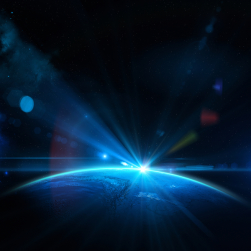A Sonic World
The Hum
Neither space nor black holes are silent.
When NASA created a sonification of the black hole at the center of the Perseus galaxy cluster in 2003, humans heard a black hole for the first time. The signals had to be resynthesized for human hearing, as they existed at about 57 octaves below middle C. These sounds are so low that even creatures that communicate in infrasound (like blue whales) can’t hear them. Humans generally hear between 20 Hertz (Hz) and 20 kHz. So scientists scaled the sounds upward by 57 and 58 octaves. Then, for the first time, humans heard a black hole. Astronomers had learned that pressure waves sent out by the black hole resulted in ripples being created in the cluster’s hot gas. These, they translated into a musical note.
We learned that space wasn’t quiet, which makes sense when considering that our home planet isn’t quiet either. Earth is a body of solid rock and metal being hurled around a gaseous ball (our sun); it’s logical that Earth sings, too.
Then, add a chorus of human vibrations and you can change planetary consciousness and quantum sound according to The Global Consciousness Project at Princeton.

